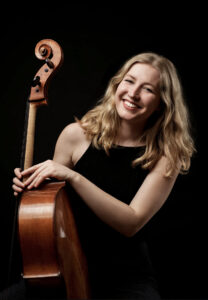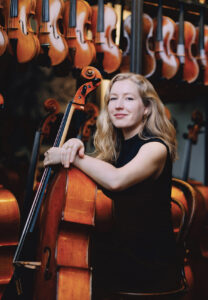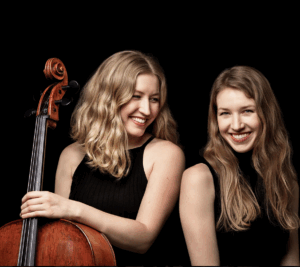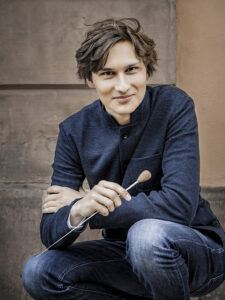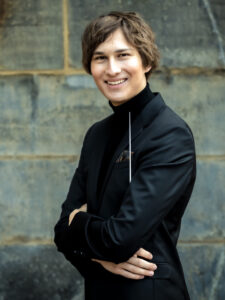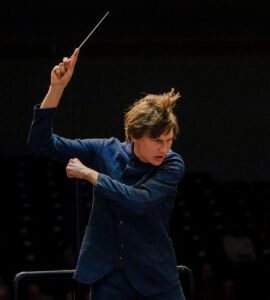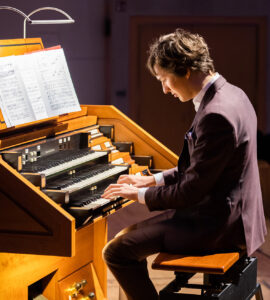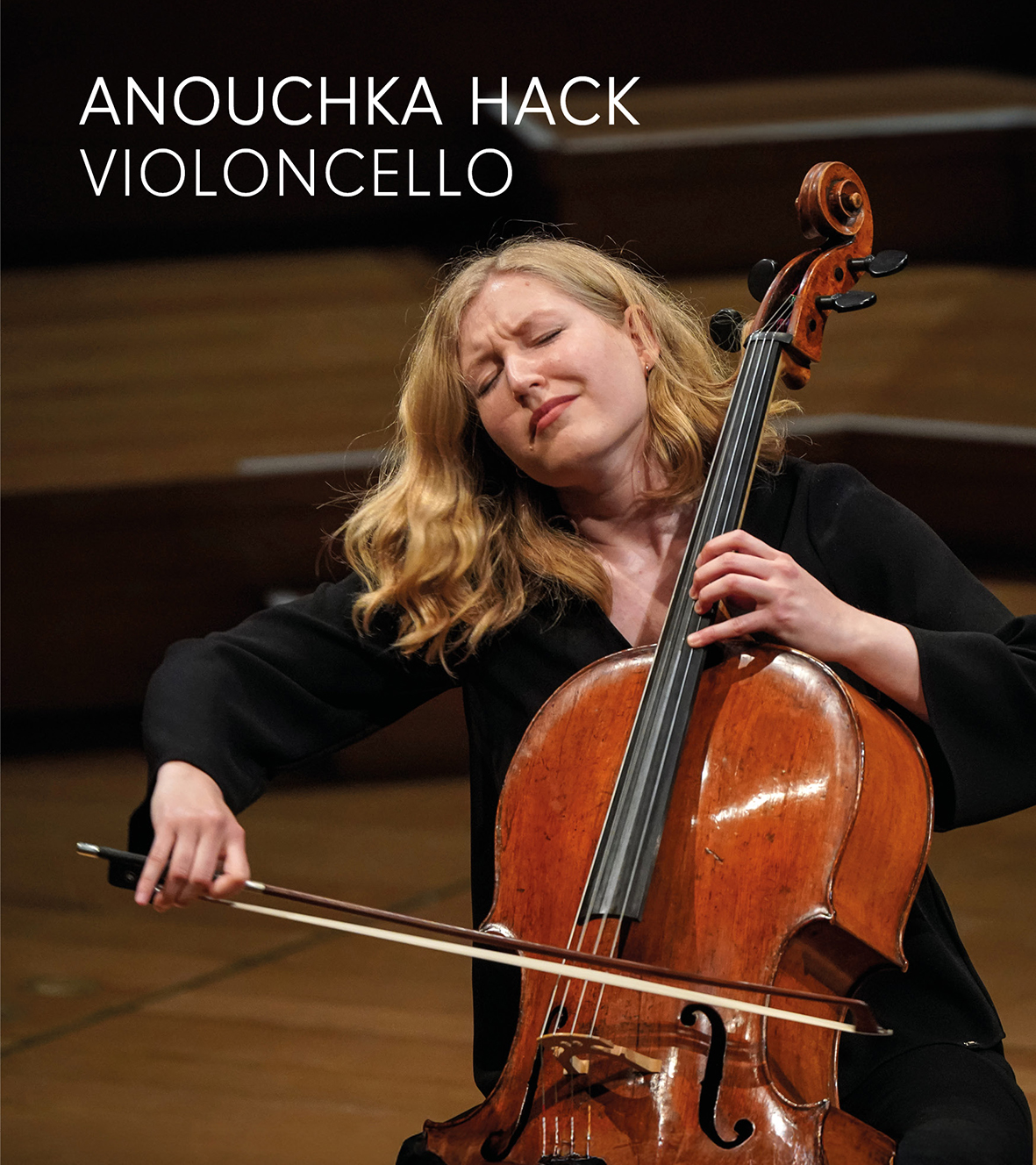
Interview with Anouchka Hack,
violoncello
The Mozart Gesellschaft Dortmund has followed your musical journey for over 14 years. I first saw you perform as a soloist in 2011 at the age of 15, playing with the Instrumentalverein at the Orchesterzentrum – your playing and stage presence immediately captivated me. Since then, I’ve followed your development as a cellist: From 2014 to 2018 you studied with Troels Svane in Lübeck, and at the age of 22, you were accepted into our sponsorship program. What did this selection mean to you at the time?
Being selected as a scholarship recipient of the Mozart Society was both recognition and encouragement for me: The selection itself was already an honor, and it was followed by many exceptional engagements and opportunities through which I grew immensely as a musician.
As part of your soloist diploma at the Kronberg Academy, you performed Haydn’s C major Cello Concerto in 2024 with the Württemberg Chamber Orchestra. Congratulations on this magnificent concert! In 2020, you thrilled audiences in our subscription series with Haydn’s D major concerto, playing with the Zagreb Soloists at the Konzerthaus Dortmund. What special memories do you associate with that performance?
It was everything one could hope for: one of the best concert halls in Europe, a renowned chamber orchestra that many of my musical idols have performed with, and one of the most beautiful – and most difficult – cello concertos. Being able to bring that to life and make music freely in such a perfect setting is unforgettable on many levels. And of course, as someone from Dortmund, it was particularly special to have such a splendid performance in my hometown, and to feel the support of my family and friends in the audience. Incidentally, the Konzerthaus is also where I made my solo debut at 16 – back then with the Dortmund Philharmonic. I feel very much at home on that stage.
You come from a musical family in Dortmund. Did performing at the Konzerthaus Dortmund carry special pressure for you?
What I especially appreciate about Dortmund is the warmth and support I’ve experienced there for years – from the audience, from people who know me, and from those who support our family. This encouraging atmosphere was a source of strength for me, and something you don’t often experience with the same intensity in other cities.
TO BE ABLE TO PERFORM AS A SOLOIST
WITH SUCH A TRADITION-RICH ENSEMBLE
IN ONE OF EUROPE’S BEST CONCERT HALLS.
Anouchka Hack
In 2021, as part of our collaboration with the Wilo Foundation, we inaugurated the Wilo Pioneer Cube as a concert venue – with you and your sister Katharina Hack. Our annual Soirée concert there has since become a tradition. What do you remember about that special performance?
It’s always exciting for me when new spaces are opened up for concerts, for musical encounters. Especially spaces that are usually used differently often have an unusual atmosphere or setup for a concert – and are then transformed by the music. I experienced the room as very open and bright – with lots of glass and a particularly warm-hearted atmosphere created by the Wilo team. It was a joy for us to fill that place with music for the first time and to discover it!
OF IMMEASURABLE VALUE
FOR MY ARTISTIC DEVELOPMENT.
Anouchka Hack
The Mozart Gesellschaft Dortmund financially supported your debut CD with works by Shostakovich, which you recorded with your sister for GENUIN classics. That album was a major milestone in your careers. Tell us more about it!
The release happened unexpectedly during the pandemic – a stroke of luck for us in the midst of a crisis. While concert halls remained closed, our CD received significant attention: It was played on nearly all major radio stations such as NDR, SWR, and ORF, and we were invited to numerous interviews. The positive media response helped us stay present during that difficult time. We are still deeply grateful to the Mozart Society Dortmund for helping make the CD project possible. In addition to sonatas by Dmitri Shostakovich, we also recorded a bonus track with my mentor Gautier Capuçon, in whose excellence class I studied in 2017/18. Our second CD, Alle Menschen werden Schwestern (“All People Become Sisters”), was released in fall 2024 in cooperation with Deutschlandfunk on the Berlin Classics label.
What was particularly valuable for you in the support of the Mozart Gesellschaft Dortmund?
Above all, the many concert opportunities I was invited to – such as the performance with Sinfonia Rotterdam, where I had the chance to play Tchaikovsky’s Rococo Variations. Thanks to the excellent concert mediation, I was able to gain important stage experience. There are things one can only learn on stage in order to grow as an artist, and at the same time, for a career to develop in the free market, you need a platform to shine – to perform with renowned ensembles and to be noticed in that context. Young musicians need patrons who recognize their talent and artistic personality and give them a big stage.
A GREAT HONOR AND RECOGNITION FOR ME
TO BE ACCEPTED INTO THIS TRADITIONAL
SUPPORT PROGRAM.
Anouchka Hack
As part of our subscription series, you will be featured in February 2026 for our 70th anniversary celebration. Together with your sister Katharina on piano and our current scholarship recipient Claire Wells on violin, you will perform Beethoven’s Triple Concerto with the Staatsorchester Rheinische Philharmonie. What does this performance mean to you?
Claire and Katharina are two of the people closest to me – musically and personally – one of my closest friends and my sister and duo partner. Playing the Triple Concerto with them at the Konzerthaus Dortmund as part of the 70th anniversary celebration is a huge gift for me. I love this music – it’s full of joy, playfulness, humor, and stunningly beautiful melodies. The interplay of the three instruments is like a musical trialogue, with the instruments challenging, outshining, and singing together. I’m incredibly excited – it’s going to be a celebration!
We couldn’t agree more and are very much looking forward to the Triple Concerto with all of you! We’re confident that this lineup was the perfect choice!
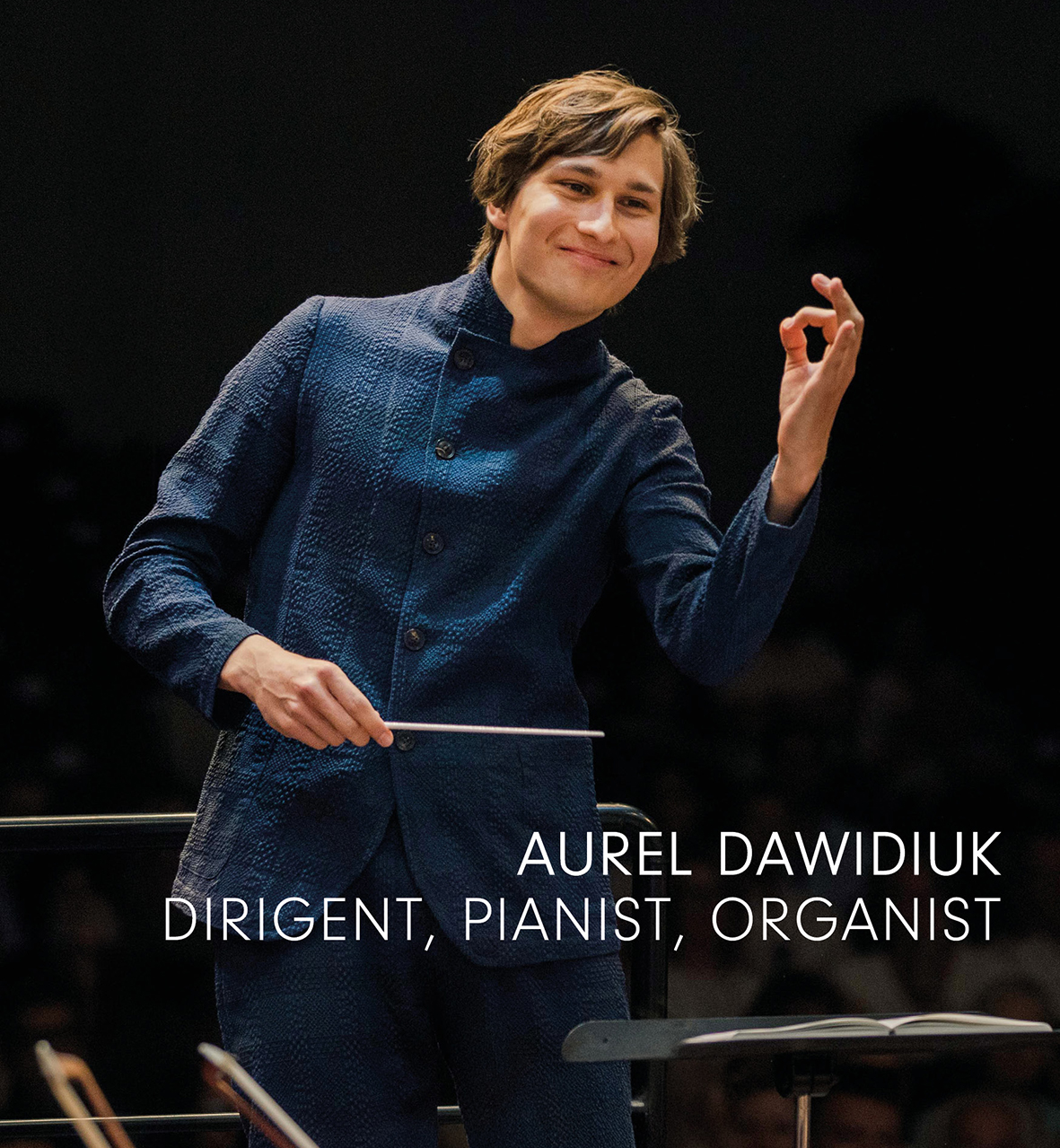
Interview with Aurel Dawidiuk,
Conductor, pianist, organist
Scholarship holder 2018
You are an exceptionally versatile musician – even back then, I was fascinated by your range: organ, piano, orchestral conducting. It seemed as if you didn’t have a clear focus. Why is it that you never committed to just one field?
That question comes up often, but for me, it never really did – it was just always that way. Intense and abundant. I never had to consciously give something up to pursue something else. Only now, with my numerous engagements as a conductor and my role as Associate Conductor of the Royal Concertgebouw Orchestra, has that changed. The responsibility, preparation, and time commitment are on another level. But in the beginning, with organ and piano, the effort was equal, and I enjoyed both. Looking back, playing piano and organ was the ideal preparation for conducting.
Did you always have many concert engagements while studying? What led to you being in such demand even as a student?
That was mainly due to competition successes, which often came with concert engagements and also support from foundations. The Mozart Gesellschaft Dortmund was one of the first institutions to support me. I not only performed with Sinfonietta Köln in your subscription series at the Konzerthaus Dortmund, but also played three more concerts as part of a tour. And of course, that helps to gain exposure. I’m very grateful for the early support from the Mozart Society Dortmund, even before my first major competition win at TONALi in 2019.
Have you ever not won a competition?
Only once – an organ competition in Toulouse. Other than that, I’ve actually won every competition I entered.
A key moment in your studies was your decision in 2020 to apply for a place in the prestigious conducting class of Johannes Schlaefli in Zurich.
Yes, that was one of the most defining decisions of my musical life! Places in his class are extremely sought after, and he usually only accepts students with extensive conducting experience. At 20, still a bachelor student, I took the leap – and being accepted into his class had a major impact on my path. It was the decisive step toward becoming a conductor.
THE MOZART GESELLSCHAFT DORTMUND
WAS ONE OF THE FIRST INSTITUTIONS
TO SUPPORT ME,
AND I’M VERY GRATEFUL
FOR THAT EARLY ENCOURAGEMENT.
Aurel Dawidiuk
What degrees have you completed?
In 2023, I completed my bachelor’s degrees in organ in Basel, and in piano and orchestral conducting in Zurich – simultaneously. I also plan to complete my master’s in all three subjects at the same institutions. I was fortunate that life in Switzerland didn’t come to a complete standstill during the pandemic – studies and concerts could continue. That allowed me to continue my education intensively even during that time. The universities in Basel and Zurich were also extremely flexible and supportive, especially regarding my concert engagements, which often meant I couldn’t be on site.
Congratulations on your appointment as Associate Conductor of the Royal Concertgebouw Orchestra for the 2024/2025 season! What was the selection process like for this position?
Four young conductors were invited for a trial rehearsal in February 2024. Klaus Mäkelä was also present. To my great joy, I was chosen after the rehearsal. Normally, the orchestra members decide after two days who they want as a conductor – and I’m incredibly happy that they made their choice after just two hours. Already in the 2024/2025 season, I’ll be involved in various concert programs and assist leading conductors like Chailly and Pappano, both in Amsterdam and on tour. Last November, I had the great pleasure of joining Klaus Mäkelä and the orchestra on a U.S. tour. You really couldn’t ask for a better start as a conductor – an absolute dream! In May 2025, I’ll lead my first project with the orchestra at the Concertgebouw Amsterdam – a chamber concert featuring a smaller version of Mahler’s Symphony No. 5. The major debut with the full Royal Concertgebouw Orchestra awaits me in April 2026.
FOR A BETTER START AS A CONDUCTOR.
Aurel Dawidiuk
Does your new position with the Royal Concertgebouw Orchestra in Amsterdam mean that you can no longer perform as a pianist and organist?
I pick out a few special gems (laughs). I already have four organ concerts planned for next year – at wonderful venues like the Vienna Konzerthaus, Cologne Philharmonie, Tonhalle Zurich, and the Auditorio Nacional de Música in Madrid. Conducting one concert after another wouldn’t be possible anyway – you have to pause at some point, take a breath, and learn something new.
How do you prepare for a conducting engagement?
It’s a big challenge, and there’s no one-size-fits-all method. Preparation depends on many factors: the work itself, the era, the size of the orchestra – and most importantly, what the orchestra needs. Is it more about organization, inspiration, technical issues? Before a debut, you often can’t fully know. Ultimately, it means diving into the score as much as possible – flipping through it, analyzing it. I also listen to reference recordings, get inspired, and develop my own interpretation along the way.
What comes to mind when you think about our opening matinee at the Konzerthaus Dortmund?
It brings a sparkle to my eyes – a festive concert and pure Mozart! You don’t get that often. It’s rare to have a program dedicated entirely to Mozart – and to present him in all his facets: opera, symphony, oratorio. And of course, I’m always happy to return to the wonderful Konzerthaus Dortmund!
We’re glowing too and are so grateful that you’ll be on the podium for our grand opening. Thank you so much!
Interview conducted by Karen Ann Bode.

